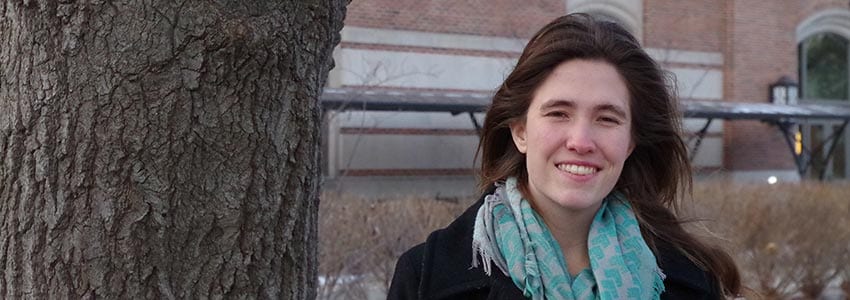Rachel has a history of engaged learning and deep commitment to volunteerism that she honed during her undergraduate experience at Emory University. In her first year of her Ph.D. program, she took an engaged learning course in the Residential College, the lone graduate student in the class. “I wanted to see how service learning worked here. It was such a welcoming community, and it was there that I got involved with PCAP.” She is now in her third semester running a theater workshop with the Prison Creative Arts Project (PCAP) which brings those impacted by the justice system and the University of Michigan Community into artistic collaboration for mutual learning and growth. Of the experience, she says, “By participating, I’m not directly acting upon my research, but I’m taking the skills I’m building in the classroom and translating them to a different population who need them, I’d argue more so than the campus community.”
In her weekly PCAP sessions, she says, “It’s not about experts going in and leading workshops. People who are invested in art are facilitating a more level playing field, trying to make it as equitable as possible. It’s been quite an eye-opening experience – I had never been inside a prison type facility. I’ve worked in a juvenile detention facility and am in a forensic psychology facility now. Some people are so hilarious, willing, and excited about getting to participate and bring this side of themselves to the forefront. Sometimes it’s really difficult and people are having a hard time, and it’s often not the most conducive location for positive creativity. It always feels really worthwhile. It does feel like I get to share the joy of theater on a regular basis and develop great individual relationships with people I wouldn’t meet otherwise.”
All of this got Rachel thinking about how to have her own classes include a component of engaged learning. She was moved to participate in the Engaged Pedagogy Initiative last semester for a foundation in thinking about techniques and theory behind making a classroom community oriented. The techniques she gleaned “helped me think about how to teach my Freshman English 125 section as engaged as possible – doing things like have students go to the opening of the PCAP art show, writing about something that’s happening in the community and things going on in the world around them, showing writing skills are not insular to your own interests and allow community into the classroom.”
Rachel is a second year Ph.D. student with an interest in aspects of community and groups in 19th century British literature with secondary interest in practices of mourning and responses to trauma.
She is finishing coursework and doing a lot of teaching this year, both enriching experiences for her. She says, “It is really wonderful that there exists so much openness in being able to take a variety classes. Right now, I’m taking a class on Native American literature, something I haven’t done before. Faculty do an incredible job to use coursework to help you find your interests. They give you so much space to develop your own projects and help shape the curriculum and take ownership of the material. I hadn’t realized how wonderful that would be.”
“Teaching really gives me a great sense of purpose in my grad school career. If I didn’t have it, this would be a very inward looking 6 years, but teaching puts everything in perspective. Education is about learning in community and sharing in both directions, and I’ve learned so much from the teaching process. Small classes allow you to get to know the students really well, and students have to be vulnerable with their writing, it feels really privileged to guide these young students through their first and second semesters of college.
When she came to U-M, Rachel was split about a career in academia or pursuing grad school for the necessary skill set and qualifications for pursing a non-profit community oriented education program. She’s still giving both tracks equal attention and exploring options as she goes. Last summer Rachel participated in the Mellon Public Humanities Fellowships, working at the National Endowment for the Humanities in Washington, DC. “It was an incredibly rewarding experience, and I learned lot about a very different world in academia. Now I’m teaching, and it’s hard not to always want to be teaching when you see that growth happen with your students. If I wanted to teach, I would want to do engaged learning type courses. If on an academic pathway, I need an avenue to feel community oriented. I wanted to incorporate this into my graduate career early on, that’s why I got involved in EPI.
She’s got some time to identify her dissertation topic and undertake her research. In the meantime, Rachel is enjoying the opportunities that come her way and the people around her. She says, “I absolutely love my cohort. Having 12 or so other people who are all on a similar pathway with you, studying very different things in English but being very invested in that we all do well together. I feel so lucky that part of graduate school is invested in building a literary community as well.”

